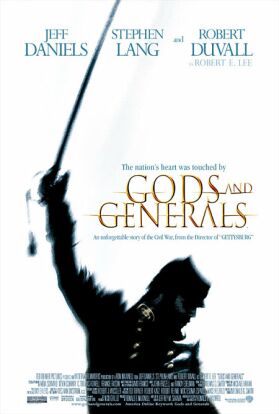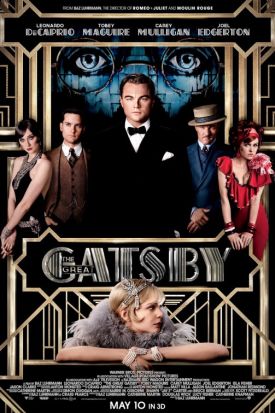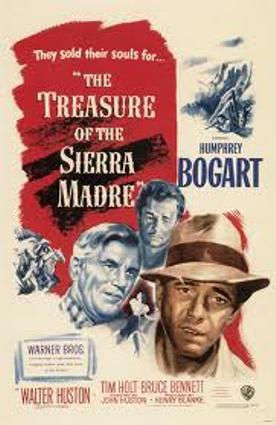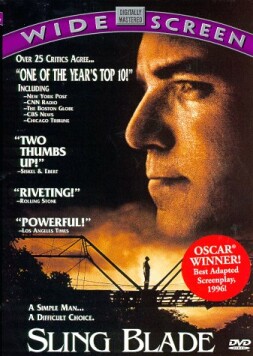Gods and Generals
After three and a half hours, you will stagger out of Gods and Generals, Ronald F. Maxwell’s prequel to Gettysburg, stupefied with pathos. From the start, it offers the full Ken Burns treatment of the Civil War, with weepy violins and catch-in-the-throat personal commentary of a highly authentic character, and it never lets up. As Oscar Wilde said of the death of Dickens’s Little Nell, it would take a heart of stone not to laugh at it. For where Burnsian schmalz was endurable for an hour, with a week to recover before the next dose, it is quite intolerable spun out to this length and administered in one sitting. The whole movie takes place on an emotional fortissimo that becomes merely wearisome where it is not laughable.
Even more disastrously, Maxwell and Jeff Shaara, author of the novel he adapted, seem to labor (and boy do they labor!) under the misapprehension that the soldiers of the Civil War were a species of preachers, their minds ever fixed on higher things and inclined to drone on about the higher things in embarrassingly poetic speeches. The love, for instance, of General Robert E. Lee (Robert Duvall) for his homeland — meaning Virginia — is “something these Yankees do not understand.” What to them are just “markings on a map” are to Marse Robert “birthplaces and burial grounds, they’re battlefields where our ancestors fought. They’re places where we learned to walk, to talk, to pray. They’re places where we made friendships and fell in love.… They’re the incarnation of all our memories and all that we are. All that we are.”
That portentous repetition of the final phrase becomes something of a tic. “It’s not yet our time, gentlemen; it’s not yet our time.” More than once, someone says: “Hail, Caesar. We who are about to die salute you.” Not that there is any actual Caesar present, apart from Julius, crossing the Rubicon in one of the more tedious voiceover ruminations by Col. Josiah Lawrence Chamberlain (Jeff Daniels). As for the eponymous “Gods,” we have only the firm Christian faith of several of the soldiers — most notably General Thomas, “Stonewall,” Jackson (Stephen Lang), the film’s real hero — to go on. One can only imagine what Old Blue Light would have made of the plural.
True, the speechifying and the poetry are livened up with a few clumsy and obvious ironies, such as having two Irish brigades, one Union and one Confederate, blazing away at each other as someone shouts: “You left Ireland to escape tyranny. . .and now you’re shootin’ each other in the land of the free!” Well fancy that. You might think that the Irish would be well used to shooting at each other, but I guess it makes a better story this way. Likewise, General Jackson, is both savagely bloodthirsty (“Only the black flag will bring them to their senses”) and mawkishly tender-hearted towards a Little Nell of his own who suffers, no one will be surprised to learn, Little Nell’s fate.
The personnel for the battle scenes come from societies of Civil War re-enactors and it is very much a re-enactors’ movie — which is to say that it has an antiseptic, educational quality in which truth-to-life is sacrificed to “authenticity.” The result is an inert, lifeless product in which the soldiers look like waxworks, the image of battle without the soul. And even the authenticity is dubious at times. The generals on both sides, for example, always seem to know who is opposite them and the disposition of his troops. There is no hint of whence comes this excellent intelligence, which makes for economy of narrative but not nearly enough of the fog of war that ultimately costs General Jackson his life.
One wants to be as generous as possible to this film because in some ways it is very daring. For one thing, it has the boldness to represent Confederate soldiers as human and sympathetic; for another it offers a welcome contrast to the war movies of the past two or three decades, which generally start from the premiss that all the shooting makes no sense at all and is undertaken either by drug-crazed psychopaths (most Vietnam movies) or by decent men with obscure private motivations of their own (The Patriot, Saving Private Ryan). But here we go to the opposite extreme, where all the characters speak and act like monumental statuary. Clearly some kind of balance ought to be struck. I’m as susceptible to the lapidary epitaph and the high and respectful language of the eulogy as any man, but they should be employed very sparingly in the movies.
Discover more from James Bowman
Subscribe to get the latest posts to your email.








